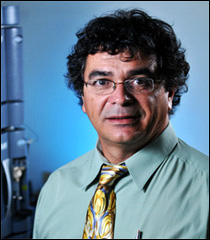By Michele Conklin
 |
| Vasilis Vasiliou |
A research team at the University of Colorado Cancer Center has identified an enzyme that could be used to diagnose colon cancer earlier. It is possible that this enzyme also could be a key to stopping the cancer.
Colon cancer is the third most common cancer in Americans, with a one-in-20 chance of developing it, according to the American Cancer Society. This enzyme biomarker could help physicians identify more colon cancers and do so at earlier stages when the cancer is more successfully treated.
The research was led by Cancer Center investigator Vasilis Vasiliou, Ph.D., professor of molecular toxicology at the University of Colorado School of Pharmacy, and published online in Biochemical and Biophysical Research Communications. Vasiliou's laboratory specializes in understanding the role of enzymes called aldehyde dehydrogenases in drug metabolism, metabolic diseases, cancer and normal and cancer stem cells.
Vasiliou's team studied colon cancers from 40 patients and found a form of this enzyme known as ALDH1B1 present in every colon cancer cell in 39 out of the 40 cases. The enzyme, which is normally found only in stem cells, was detected at extraordinarily high levels.
"Other potential colon cancer biomarkers have been identified in the past, but none thus far are present in such a high percent of the cancer cells and virtually none are overexpressed like this one," said Cancer Center investigator David Orlicky, Ph.D., associate professor of pathology at the CU medical school and a member of the research team.
This finding is particularly timely as it was recommended at the recent Human Genome 2011 annual meeting that a chemical analysis for biomarkers should always accompany genotyping in early detection of colon cancer, says Vasiliou, who attended the meeting in Dubai.
It appears that ALDH1B1 aids the development or growth of these cancer cells because it would not be present in every cell at such high levels if it were simply a byproduct of the cancer. Based on this finding, the enzyme may provide a way to treat the disease, said Ying Chen, Ph.D., lead author and assistant professor of molecular toxicology at the CU School of Pharmacy.
The team is now studying how this enzyme is up-regulated into colon cancer cells and its exact role in the physiology of the tumor cells, Vasiliou said. The team also is seeking to understand the substrate, inhibitors and activators of ALDH1B1.
"Our efforts are focused on developing a drug that could turn into a toxic compound and kill the cancer cell when acted upon by the enzyme," Vasiliou said. "It would act like a suicide pill, if you will."
Vasiliou's team is collaborating in this work with laboratories at the National Cancer Institute, Scripps Research Institute in California, University of Melbourne in Australia, University of Heidelberg in Germany and Oxford University in the United Kingdom.
"This work will be considered a landmark in the understanding of basic metabolic processes within the colon cancer cell," Orlicky said.

|

